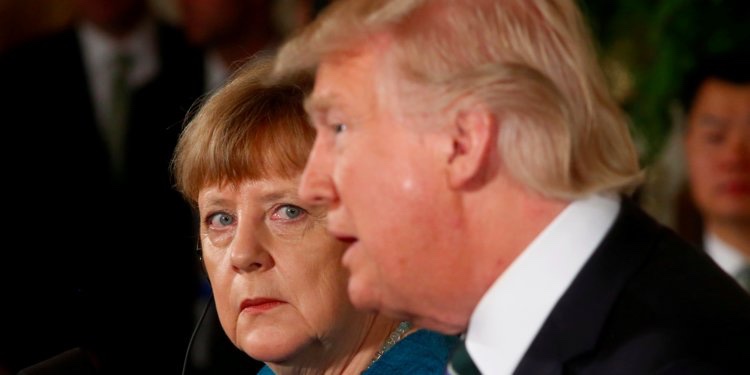 EU warns Trump of nuclear arms race risk after INF withdrawal move
EU warns Trump of nuclear arms race risk after INF withdrawal moveSome European leaders oppose US withdrawal as John Bolton visits Moscow to discuss treaty
Julian Borger in Washington and Andrew Roth in Moscow
Mon 22 Oct 2018 14.09 EDT
Last modified on Mon 22 Oct 2018 15.11 EDT
The EU has warned Donald Trump about the risk of a new nuclear arms race after the US president announced that he was pulling out of a Reagan-era arms control treaty.
John Bolton, Trump’s hawkish national security adviser who has lobbied for US withdrawal from the 1987 Intermediate-range Nuclear Forces (INF) treaty, is in Moscow to discuss the treaty, which the US accuses Russia of violating with the development of a new ground-launched missile.
Trump says US will withdraw from nuclear arms treaty with Russia
Bolton on Monday first met with Nikolai Patrushev, the head of Russia’s security council and a close ally of Putin, and foreign minister Sergei Lavrov. Lavrov said before the meeting that Russia had not yet received confirmation that the United States was exiting the treaty, but warned that such a decision would trigger a response from Russia to achieve “parity”.
European leaders have supported the US in calling for the Russian government to be more transparent about its new missile and its capabilities, but have been overwhelmingly opposed to US withdrawal from the INF, which has kept nuclear missiles out of Europe for three decades.
“The INF contributed to the end of the cold war and constitutes a pillar of European security architecture since it entered into force 30 years ago,” a spokeswoman for the EU foreign policy chief, Federica Mogherini, said in a statement.
“Thanks to the INF treaty, almost 3,000 missiles with nuclear and conventional warheads have been removed and verifiably destroyed,” the statement said. “The world doesn’t need a new arms race that would benefit no one and on the contrary would bring even more instability.”
The French president, Emmanuel Macron, raised the issue with Trump in a phone call on Sunday, a day after Trump had declared his intention to withdraw from the INF at a political rally in Nevada.
“The president of the republic underlined the importance of this treaty, especially with regards to European security,” the French foreign ministry said. “France attributes great importance to conventional and nuclear arms control instruments … We call on all the parties to avoid any hasty unilateral decisions, which would be regrettable.”
Gavin Williamson, the UK’s defence secretary, issued a statement in support of the administration, expressing a preference for the treaty to survive but putting the blame on Russia.
“We of course want to see this treaty continue to stand but it does require two parties to be committed to it and at the moment you have one party that is ignoring it. It is Russia that is in breach and it is Russia that needs to get its house in order,” Williamson said in a statement.
Oliver Meier, the deputy head of the international security division at the German Institute for International and Security Affairs, said: “Trump’s sudden decision to terminate INF puts Germans in a difficult spot. Most see Russia as being responsible for the INF crisis but do not understand what Trump hopes to achieve by withdrawing from the treaty.
“There is a fear that in a post-INF world, discussions among Nato allies about appropriate military responses to Russia’s actions would become more difficult,” Meier said. “There is little faith that deployment of additional ground-launched cruise missiles would convince Russia to come back to the table. All of this would play into Putin’s hand.”
The decision to withdraw from the INF has been widely criticised as a mistake by US nuclear experts, who say it will benefit Russia more than the US, arguing that Russia will now be unshackled in its development of short- and medium-range ground-launched nuclear missiles, while the US is unlikely to find allies willing to host such missiles on their soil.
They say the same goes for the Pacific, where China’s development of medium-range missiles has been cited as one justification for freeing the US from the INF’s constraints.
“Thirty-five years ago, the United Kingdom, West Germany, the Netherlands, Italy and Belgium agreed to deploy 572 nuclear-armed U.S. ‘Euro-missiles.’ None of them appear willing to accept them now,” Michael Krepon, co-founder of the Stimson Centre thinktank and a veteran writer on nuclear weapons issues, wrote on the ArmsControlWonk blog.
“Nor is there likely to be enthusiasm among Washington’s friends or allies in Asia about hosting nuclear-armed, land-based missiles. Japan, South Korea, the Philippines and Vietnam all seem unlikely to host these missiles.”
No comments:
Post a Comment